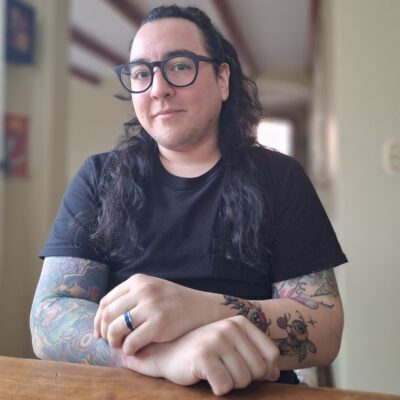Student Spotlight: Pascal Caraccioli Salinas

July 14, 2025
Pascal Caraccioli Salinas is a doctoral student in geological sciences from Santiago, Chile. He earned his bachelor’s degree at Portland State University and now studies hydrothermal and geothermal systems under the guidance of Carolina Munoz-Saez and Seth Saltiel at Cornell.
What is your area of research and why is it important?
My research broadly focuses on hydrothermal and geothermal systems. Because these systems are located at depth, we can’t directly observe them. They are also dynamic. The main pathways where fluid moves (fracture network) can evolve over time. For example, minerals can precipitate closing channels, thermal processes can reshape the pathways, and changes in the stress field may create new pathways or reopen preexisting ones. All these factors make modeling of fracture-flow dynamics very challenging. I aim to tackle these challenges by using seismo-acoustic signals to identify signatures that allow us to detect what is happening below the surface and uncover real-time changes.
What are the larger implications of this research?
Subsurface flow in fractured media has many important applications. The most evident example and my main motivation is in geothermal energy, where understanding fluid-fracture in these systems can help develop geothermal plants. However, this research can also be used in water management, CO2 storage, and nuclear waste storage, among others. In geothermal energy specifically, we can reduce our dependence on fossil fuels and increase our energy independence.
What does it mean to you to have been received a Department of Energy Computational Graduate Fellowship (DOE CSGF)?
I’m very honored and grateful for this fellowship. This fellowship represents an opportunity to broaden my professional network and build connections with other scientists. One very valuable thing I’ve learned here at Cornell is the importance of making connections with research communities outside my discipline and understanding work beyond my own bubble. The DOE CSGF will allow me to connect with researchers I might not have encountered otherwise.
What will this fellowship allow you to do that you might not have otherwise?
The focus of the DOE CSGF is integrating high-performance computing to solve science and engineering problems. Because of this, the fellowship includes computing time access at the National Energy Research Scientific Computing Center. There’s also a practicum component in which the fellow interns at a national laboratory for 12 weeks. The fellow decides where and whose team to join. So, this is an amazing opportunity to connect to researchers across the United States who have similar interests.
What are your hobbies or interests outside of your research or scholarship?
I enjoy cooking for my family. Family is very important to me, so I love to spoil them with a delicious meal. I value my time with them very much.
Why did you choose Cornell to pursue your degree?
Cornell was my first choice for the doctoral program. Once I got the acceptance letter to the program, I accepted immediately, before visiting. I was absolutely certain that I wanted to work with both my advisors, but I was also motivated by Cornell’s strong commitment to sustainability and clean energy. These efforts are demonstrated, for example, by the university’s plan to heat campus using geothermal energy.
